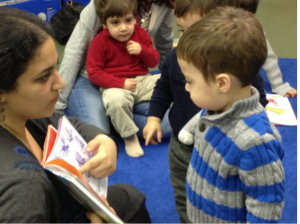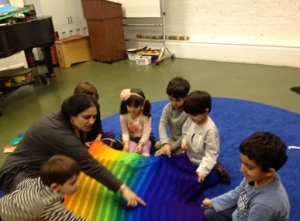Just a few days ago, I was on my way to work and talking to one of my best friends and said to her “I wish we had more cultural centers locally dedicated to educating children or really anyone about the Iranian American culture. I worry our culture will be lost one day” We really don’t have much… and most of those that do exist are probably in California. Coincidentally, just the next day, I saw a link online for the a creative school of language and arts. They had a fundraiser going on, so I donated some money. Although this is not currently in Boston (I hope one day!) I was excited to see this and wanted to support it.

Aitak Ajangzad is the Founder of a creative school of language and arts for Iranian American children, through music, storytelling, visual arts, theater, poetry, and dance.
Here is her story:
What is your business?
I’m starting a creative school for bilingual/multilingual Iranian American children in NY and DC, which includes special early childhood classes for children as young as one years old. The goal of our program is to create a loving, musical and artistic environment for children and families to gather together, socialize, engage in fun cultural activities and learn about Farsi through interacting with friends and through meaningful hands on experiences like music, story telling, visual arts, theater, poetry and dance. Although our principle audience is Iranian-American children and their families, we will also be offering a special music program for children of all backgrounds.
Why are you starting this school?
The development of this program has been part of my doctoral dissertation research at Columbia University. My academic and professional background has been strongly concentrated on the practice of music, visual arts, and education.
Upon starting my research, I soon realized that throughout the past few decades, not much attention has been given to children’s cultural education. I also conducted several interviews with 2nd generation Iranians my age, and asked about their experience with Farsi schools when they were growing up. I mostly heard unhappy stories about being forced to attend Farsi schools by their parents, while their education at these schools constantly failed to make any relevance to their lives. This contrast, along with their parent’s insistence and their dislike of the programs, often resulted in them facing identity problems as they grew up.
I wanted to find a solution to this problem and offer a new program which proposed a new pedagogical approach in teaching language to these children, starting from an early age. Also, I wanted to stress on the importance of early childhood education. Starting cultural education from an early age, helps children gain understanding and learn about their parental language within a warm community. This will all hopefully build a ground for a healthier and happier growth in children.
What were some challenges you faced, if any?
In developing the program, one of the biggest challenges was to create appropriate educational material for children. Therefore, I have been active in developing these materials because there is really a big need here. Especially children’s music, it‘s amazing how little music has been produced for children through out the past three decades. Music is a really strong educational medium for children. So as a music educator I believe that there should be a lot more dedicated on recognizing music as an educational medium, and creating more musical materials for children and teachers to use. Also we don’t really have many professional educators in the field, so in order to face this challenge we plan to hold teacher training programs.
What are your goals for this school?
Today children grow up in multicultural classrooms, recognizing themselves more and more as part of a global community. My goal is to introduce our program within several communities in the east coast through the next year, and also provide more opportunities for children’s cross cultural understanding and education.
Thank you for this interview Aitak!
Help support this school and donate to this campaign. Think of it as a possible future location for your own children one day.
Other information:


